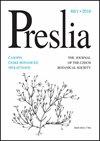Participation of the Czech flora in succession at disturbed sites: quantifying species' colonization ability
IF 2.9
2区 生物学
Q1 PLANT SCIENCES
引用次数: 31
Abstract
The colonization of newly created sites by plants is determined by the characteristics of the species and their frequency in the surrounding landscape (mass effect). We used species frequencies from the Database of Successional Series of various disturbed sites across the Czech Republic (DaSS, 2817 phytosociological releves, 1013 species of vascular plants) to calculate two indices of species colonization ability. One index (index of colonization potential - ICP) was corrected using occurrence data in the Czech National Phytosociological Database (CNPD) and the other (index of colonization success - ICS) was used without correction. We also evaluated the participation of species in successional stages of different ages and assessed their maximum cover. Then we asked, species of which habitat types are the most successful in colonizing disturbed sites and how their participation changes over the course of succession. Species characteristic of the following habitat types were statistically over-represented in the successional series compared to in the CNPD: synanthropic habitats; cliffs, screes and walls; acidophilous grassland; dry grassland; and sandy grassland. Species characterizing particular types of habitat exhibited significant trends in their participation in different successional stages: those of dry grassland, heathland, scrub land and forest increased during succession whereas species of synanthropic acidophilous grassland, mesic grassland and wetland decreased. Species with high values of both indices are more likely to spread in landscapes continuously disturbed by human activity. Thus, these indices can help to predict future changes in vegetation in central-European landscapes and be used in ecological restoration projects.捷克植物在受干扰地点的演替参与:量化物种的定植能力
植物对新创建地点的殖民是由物种的特征和它们在周围景观中的频率(质量效应)决定的。我们利用捷克共和国不同受干扰地点的演替序列数据库(DaSS, 2817个植物社会学资料,1013种维管植物)中的物种频率来计算物种定殖能力的两个指标。其中一个指数(定殖潜力指数- ICP)使用捷克国家植物社会学数据库(CNPD)中的发生数据进行校正,另一个指数(定殖成功指数- ICS)不进行校正。我们还评估了不同年龄演替阶段的物种参与,并评估了它们的最大盖度。然后我们问,哪种栖息地类型的物种最成功地在受干扰的地点定居,以及它们的参与在演替过程中是如何变化的。与CNPD相比,以下生境类型的物种在演替序列中具有统计学上的代表性:共生生境;悬崖、碎石和墙壁;嗜酸的草原;干草原;还有沙质草原。特定生境类型的物种在不同演替阶段的参与表现出明显的趋势:干草地、石楠地、灌丛地和森林的物种在演替过程中增加,而共生嗜酸草地、中散草地和湿地的物种则减少。两个指数均较高的物种更有可能在持续受到人类活动干扰的景观中传播。因此,这些指数可以帮助预测中欧景观植被的未来变化,并可用于生态修复工程。
本文章由计算机程序翻译,如有差异,请以英文原文为准。
求助全文
约1分钟内获得全文
求助全文
来源期刊

Preslia
生物-植物科学
CiteScore
5.20
自引率
29.40%
发文量
8
审稿时长
>12 weeks
期刊介绍:
Preslia is a peer-reviewed scientific journal publishing original research papers on plant systematics, morphology, phytogeography, ecology and vegetation science, with a geographical focus on central Europe. The journal was founded in 1914 and named in honour of brothers Jan Svatopluk Presl (1791–1849) and Karel Bořivoj Presl (1794–1852), outstanding Bohemian botanists. It is published quarterly by the Czech Botanical Society.
 求助内容:
求助内容: 应助结果提醒方式:
应助结果提醒方式:


